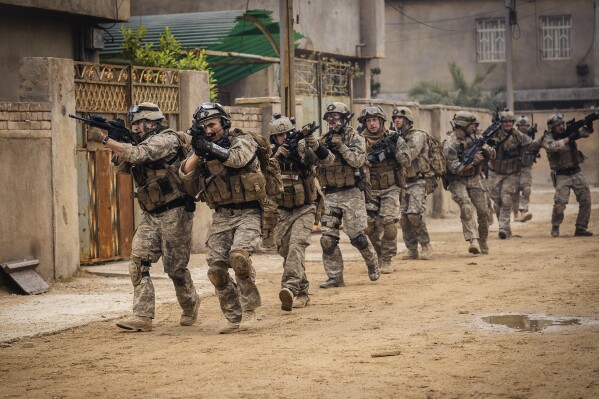Warfare (4 stars out of 4)
The best movies often feel like experiences, and Alex Garland’s “Warfare” is such a film. The only question is whether you feel you can handle the ordeal.
Set in the Battle of Ramadi in 2006 during the Iraq War, “Warfare” was co-written and directed by veteran Ray Mendoza, who was present for the events of the film. The premise feels similar to 2001’s “Black Hawk Down” in its fundamental elements: when an operation goes bad, a group of American military personnel find themselves under siege in enemy territory, and must fight the good fight until rescue arrives.
In this case, the personnel are a platoon of Navy SEALs who occupy a residential home in Ramadi in order to surveil the activity of suspected Iraqi insurgents. Initially, the SEALs are only documenting the most fleeting of suspicious activity, but gradually the evidence accumulates, and after someone lobs a grenade into the SEAL’s position, it becomes clear that substantial forces are closing in for the kill.
An initial exchange prompts the SEALs to order an evacuation, but when the first rescue attempt goes tragically awry, the platoon is left marooned in the home against increasing odds.
Stripped to its rawest elements, “Warfare’s” plot belies its greatest strengths. From the early stages of the operation, Garland maintains and gradually increases an almost suffocating level of tension. “Warfare” doesn’t use any single-take tricks or other gimmicks, but limited cutaways to events outside the home give the audience the sense that you are in the middle of the situation with the platoon. In spite of the film’s comparatively short 95-minute run time, the experience feels as exhausting as if you had been there for hours.
The ensemble cast offers a full range of perspectives on the experience. Platoon leader Erik (Will Poulter) is shell-shocked by the initial exchange, and struggles to fulfill his duties as enemies converge. Sam (Joseph Quinn) and sniper Elliott (Cosmo Jarvis) are injured in the first failed rescue, and their fellow SEALs struggle to attend to them while simultaneously fighting off the attackers outside. Tommy (Kit Connor) is the wide-eyed rookie who got tossed into the deep end of the pool, and D’Pharaoh Woon-A-Tai fills the co-director’s role as Ray.
While never gratuitous, “Warfare” shows no hesitation in displaying the violent carnage of its subject. While mainly contained to Sam and especially Elliott’s injuries, the film sets out to demonstrate the full scope of the situation, and more sensitive audiences will struggle with the stark brutal realities of the battle.
“Warfare” also manages to offer a range of perspectives on the conflicted situation. Throughout the siege, an Iraqi family remains huddled in a bedroom, and you never forget that they will be left to pick up the literal pieces once the battle moves on.
But for all of its effective elements, nothing in the film stands out so much as its use of sound. Rarely has sound ever played such an important role in a movie. Where even the best war movies tend to be routine with their depictions of battles and explosions, supervising sound editors Ben Barker and Glenn Freemantle expertly use their palette to give audiences a sense of what the SEALs are hearing—or at times, what they aren’t hearing—in the middle of a battle.
The sum total is a unique and memorable war movie experience meant to give viewers an acute appreciation for what happens in the operations we only see filtered through news reports or lesser films. And to its credit, “Warfare” does its best to let the audience draw their own conclusions.
“Warfare” is rated R for bloody wartime violence and carnage, as well as persistent profanity.

